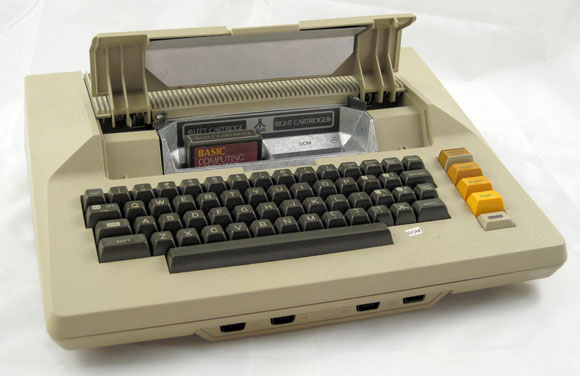Like everyone who makes it to middle age, I have a rich tapestry of memories. Today, while bicycling, I reminisced about my first computer, an Atari 800.

The year was 1979, my freshman year of high school, and I got exposed to the new computer lab at school. It had (I think) 4 Apple ][+’s each with two disk drives, and small color composite monitors. I was in love. Of course, I couldn’t afford one of these, but Atari had just released their line of computers. Not as slick and sexy as the Apple ][‘s but it was in a price range that I could afford on my paper route money.
After saving my nickels, I went out and splurged on an 800, and an 810 disk drive. I added a Basic cartridge, and I bought a game. Star Raiders if I recall correctly. I had am amazing amount of fun exploring that system. I found some local users, and we started swapping disks of software, and I was happy.
I learned Atari basic, some very simple 6502 machine language, and some of the cool capabilities of these systems. Then sometime in 1981 or 1982, I learned about electronic BBS’s. At the time, the IBM PC hadn’t been launched, and if you wanted a personal computer, it was Apple, Atari, or Commodore (This was before the VIC20 and the C64 – so it was the older PET computers). I had heard of this thing called BBS’s, and I once again saved my dimes to buy a modem. I also had to buy an interface box (called the 850 I think, or was it 815?) to connect it to (the box had 4 RS232 ports), and I got online for the first time. There were a ton of great Atari BBS’s, probably 40 – 50 in the San Jose area (no toll area for me), and I logged in to most of them. There were message boards, file exchanges, and even chatting with the operators of the BBS’s (called “Sysops”).
I was hooked. I had a growing collection of software, and was enjoying the interchange, but the bug to run a BBS bit me. I found a copy of the most used program, FoReM (Friends of Ricke E Moose), and off I went.
The name was “The Hotel California” (I was going through an Eagles phase), and I made the entire board a music theme. I probably had 20 calls a day on the average. In those days kids, you had to use a phone line to call another computer. I also did a fair amount of customization to the software (It was written in Basic XL) which was a struggle because it barely fit in memory to run. Often you had to rewrite a subroutine to save a few bytes before you could add somewhere else. I added a lot of hardware to the system as time went on, more disk drives, a special adaptor that let me use 8″ disks (3X the storage per disk) and from a 300 baud Hayes modem up to a 1200 baud modem (don’t recall the brand). I also remember writing some assembly code that was executed from a string to be able to transmit data at 1200 bits per second. Heady stuff indeed. Eventually it ended up on an Atari 800XL that I had hacked 128K of memory into (used the extra memory as a ramdisk to speed the message board IIRC).
I ran the BBS for a bunch of years, and had a blast, but eventually I moved on to a 16 bit Atari, and to a PC clone. I made some friends that I still have today (Mike Davis, and Vern Anderson who ran the “Rat’s Nest” bbs, and was my guitar teacher).
I have a 130XE, the last of the 8 bit line for Atari that I break out to play games on once in a while. I have a ton of old software that I can run in an emulator, or on the real hardware. It is “fun” to return to the archaic past, and relive some experiences, but it reminds me of how well we have it now.
Next installment – my migration to the world of PC clones.